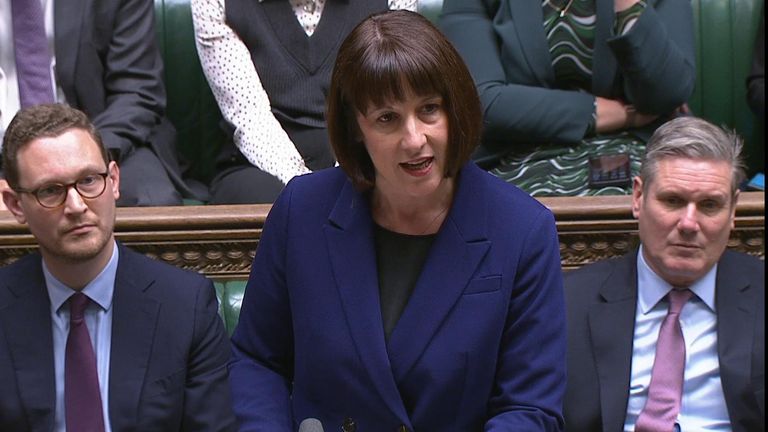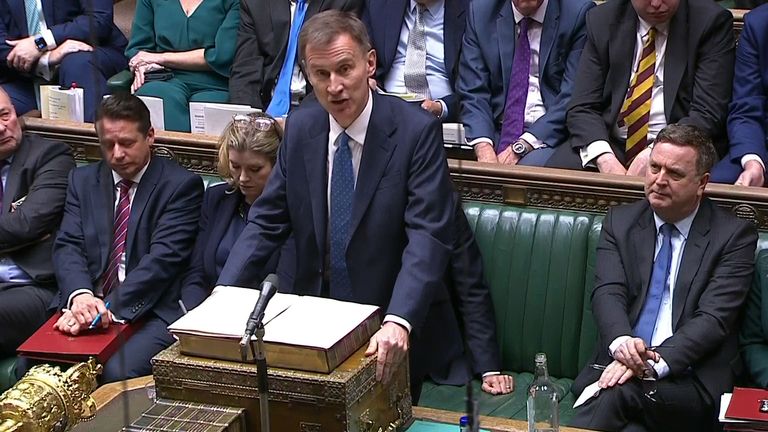
In her initial response to the autumn statement, Labour’s Rachel Reeves didn’t focus on any of the individual economic policy announcements by Jeremy Hunt.
Instead, she made a series of political arguments rebuffing his optimistic tone – arguing that today merely reinforces “the full scale of the damage to the economy” done by the Conservatives over their past 13 years.
The shadow chancellor has been making this point for the past year or more, and now claims to be vindicated by Office for Budget Responsibility forecasts revising growth projections down.
Politics Hub: Follow live updates and reaction to the autumn statement
Ms Reeves did her best to undercut the chancellor’s positive imagery by claiming that – instead of turning a corner – the economy has hit a dead end.
Nothing announced, she said, will make any real difference. Her expression was severe, her tone uncompromising.
We’re likely to hear much more of this kind of rival economic analysis from the two parties in the run-up to the next general election.
Clearly, the PM and chancellor want to set a route out of the cost of living crisis and towards the sunlit uplands of economic growth and prosperity.
Finally, with inflation falling, they believe they can tell voters that the situation is improving – thanks to their stewardship.
For Labour, the argument is that the Conservatives can’t be trusted with the nation’s finances – that they’ve run it to the ground, and change is needed in order to undo their mistakes.
The risk with this strategy is sounding too negative – of being the doomsters and gloomsters so derided by Boris Johnson. But if this analysis chimes with how voters are feeling, then the Tories look completely out of touch.
For all the giveaways in the autumn statement – with cuts to national insurance and alcohol duty frozen – the tough Conservative messaging on welfare is also likely to prove politically divisive.
The chancellor’s plans to reform welfare and encourage the long-term sick back into employment had been widely trailed in advance.
This crackdown on the long-term unemployed gave him the scope to make a number of traditional Tory arguments and attacks on Labour to set out clear dividing lines between the party- “they think compassion is about giving money, we think it’s about giving opportunity” for example.
The sticks to the unemployed are balanced by the carrots of a substantially higher national living wage and uprated benefits – but the key message from this speech was about the importance of work.
The difficulty with this argument is the obvious point that the Tories have presided over record numbers of people leaving the workforce in recent years. Labour argues they’ve long been calling for more support to help people return to employment.
But the chancellor knows that his backbenchers, and many Tory voters, are keen to see this touch language around work and benefits -and to take action to reduce the country’s huge welfare bill.
Read more:
Key autumn statement announcements
Two million Britons to get a pay rise in April
After the U-turn on net zero policies, the Tory party conference, and the King’s Speech all fell fairly flat, today was widely seen as Rishi Sunak’s final opportunity to launch a real government reset ahead of the general election, building on the enthusiastic coverage of last week’s reshuffle.
But has the chancellor really done enough to make that much of a difference?
Despite a 20-point lead in the polls, Labour have consistently been careful not to appear complacent – and repeat the mistakes made ahead of their unexpected general election defeat to John Major in 1992.
But in her response to the autumn statement, Rachel Reeves sounded more confident about the prospect of imminent government defeat – arguing the “sun is beginning to set” on the current Conservative administration.















